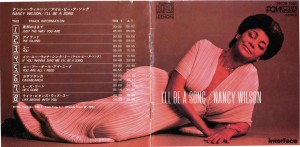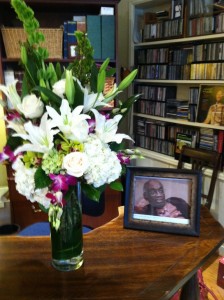When Mr. Hurskin first came to Crown City Veterinary Medical Group, it was with his young German Shepherd named Cleo. This Afro-American man in his mid 60s, tall of stature with a military bearing, was cordial but reserved. Over the years of bringing Cleo in for routine care, Mr. Hurskin became friendly with Dr. Tyson and her staff.
After awhile they learned a little of his history. Mr. Hurskin was first drafted in 1966, but was deferred because he was still in school in Mississippi. A few years later he moved to California. By 1970 he was working security for the Pasadena school district, but was drafted again in 1971. He served three years in the Army, both stateside and in Frankfurt Germany, repairing infrared night vision equipment. When he mustered out he returned to his security job for several more years before moving on to a jobs in aerospace and finally security for the Los Angeles Department of Airports, from where he eventually retired.
As Cleo aged, she developed hip dysplasia and Dr. Tyson worked with Mr. Hurskin to reduce the dog’s weight. Mr. Hurskin was really open to hearing someone who wanted to use preventative care instead of simply band-aiding the problems. With guidance from Dr. Tyson, he mounted a crusade to reduce Cleo’s size which would put less pressure on her hips and retard the pain and progression of the dysplasia. Cleo went from being a 120 pound German Shepherd to being a 89 pound German Shepherd, essentially extending her life for several more years than she would have had otherwise.
Animal care is not always easy, but Mr. Hurskin was impressed with what could be done when it came to rehabilitating an animal. With the ongoing encouragement from the veterinary staff, Mr. Hurskin stayed the course. “I wouldn’t let him not do what he needed to do,†recalls Dr. Tyson.
And Mr. Hurskin became attached to Dr. Tyson. “She’s like a sister to me. She’ll say anything to me to keep me from doing something stupid. That’s what I like about her. She talks to me like she a big sister, and she’s caring,†explains Mr. Hurskin. “That’s what I like about her. She’s a very caring person. She doesn’t want to be hurt, which I can’t blame her. She got a tender heart, a very tender heart.â€
In the end it was not the dysplasia that ended Cleo’s life, it was a tumor that was initially found on one of her limbs. When tumor ended up popping up in her chest at the late phase of her life, Mr. Hurskin brought Cleo to the clinic so that she could end her life peacefully without any pain.
What’s remarkable about Mr. Hurskin is that very soon after he had lost Cleo, he realized that his good, and his purpose in life, is best suited for a companion, maybe another shepherd. Without hesitation he came back to the clinic and said, “I don’t know what you have in store for me but I know you said that there were animals in need. I am in need.”
“I think that abrupt loss was enough for him to also want to reinvest himself in a different way,†said Dr. Tyson thinking back on her decision to unite Mr. Hurskin with Nigel, a 40-plus pound brown-and-white 11-year-old English bulldog in need of a human companion who would take care of him and who would give him purpose. Nigel was one of the many dogs who were under the care of the Asper de Tyson Foundation and Sanctuary, a non-profit organization that takes a holistic approach to the natural contributions that flow back and forth between People, Animals and the Planet.
 Nigel, who had come back to the foundation not long before Cleo’s passing, is an interesting case because he wasn’t abandoned or treated badly. He was an adorable puppy bought in a pet store by a lovely couple who loved him.The couple didn’t know that bulldogs are prone to have eye problems, but they took care of him as best they could.
Nigel, who had come back to the foundation not long before Cleo’s passing, is an interesting case because he wasn’t abandoned or treated badly. He was an adorable puppy bought in a pet store by a lovely couple who loved him.The couple didn’t know that bulldogs are prone to have eye problems, but they took care of him as best they could.
By the time Nigel turned eight, the couple had exhausted their funds and, desiring to start a family, they could not afford the ongoing veterinary expenses. Nobody wanted to take a dog that needed surgery and they did not want to put him down. Luckily, Dr. Tyson was Nigel’s vet and she told the family that if they gave him to the Foundation, she would take care of his medical needs and find him a home. They agreed.
Nigel had so many skin folds around his eyes that he couldn’t see. Dr. Tyson resected Nigel’s face and his eyes and allowed for him to see again. Two surgeries plus some recovery time and he was ready for his next life’s assignment.
For a short time, Nigel went to live with a client who had a female bulldog in need of a friend. That worked great until the other dog passed. Soon after, Dr. Tyson took him back because the man was too busy to take appropriate care. Once a Foundation animal, always a Foundation animal.
Even though Mr. Hurskin was thinking to get another shepherd, Dr. Tyson tasked him with fostering Nigel for a weekend. Mr Hurskin did, a little reluctantly, and then brought Nigel back when the weekend was over. But Dr. Tyson had seen, or maybe felt, that they were meant to be together and she was not surprised when Mr. Hurskin called and asked for a second weekend. Man and dog, Bill and Nigel, had bonded.
Nigel went home with him with all of his bag of tricks, his medicine, his special food, his eye wipes. A baggage of things that needed to be done three or four times a day, and Mr. Hurskin was ready for the task. That would not have been true a decade before, believes Dr. Tyson. “Back then he would have said, ‘What? People do what for their dogs? Are you kidding? You use face wipes? They have special things? You wipe their boots? Like really, this is a lot more than I had signed up for.’” But now Mr. Hurskin was ready to do it, realizing that without a friend to care for he wasn’t complete. “Without hesitation he signed up for it knowing that Nigel was coming with all of that,†recalls Dr. Tyson.
Nigel likes routine and so does Mr. Hurskin. Nigel’s preference is early to bed and late to rise. “He’s is something else,†says Mr. Hurskin. “He doesn’t like to sit up late. I would be trying to do things on the computer and he’d want me to go to bed at 8:00, 8:30. Yeah, come scratch me on my leg. I’m thinking he wants to go outside. No, uh-uh. He wants me to come go to bed. If I didn’t get all the way in bed, he wouldn’t get in bed until I got all the way in bed.  Yep. Then, he would come up, climb up the little footstool, and come up and he want to lick me in my face I don’t know how many times. English bulldogs, they’re heavy. Sometimes, he’d want to stand on my chest. I’m like, ‘Oh, no! You can’t stand on my chest now.’ In the morning he wanted to stay in bed. Sometimes, we wouldn’t get up ’til 10:00 or 11:00. Then, I’d get up, clean his eyes, wash his eyes out and everything. Feed him. Then, I’d go out in the backyard, sit in the sun, and have my coffee.â€
Mr. Hurskin was once married and has a daughter who, he recently found out, is living in Sacramento, now retired from the Air Force. He hasn’t seen her since she was a teenager, and he’s never met his grandson. They are estranged. So it’s just Mr. Hurskin and Nigel enjoying coffee in the sun and long walks.
They also listen to music together. “I like music,†says Mr. Hurskin. “You can just listen to music, you can relax. If you’re working, it’ll make you forget about thinking about your time. I took a class in classical music, so I could understand what it was about. Then, once I understood it, I took a liking to it, too.â€
“You know the strange thing?,†Mr. Hurskin reminisces. “I could get dressed to be around the house, or I can get dressed to go somewhere, and have on the same thing. But Nigel, he could tell when I was going to go somewhere. Yeah. He’d head straight for the door. I started taking him everywhere I went. He’d get in the back seat of the car and just go to sleep.â€
Mr. Hurskin enjoyed good health most of his life, but early in 2015 he was diagnosed with terminal cancer, but Mr. Hurskin and Nigel were not ready to part. Nigel requires a lot of care, cleaning his eyes several times a day, tending to his allergies with a special diet, and he has heart issues as well. They both felt a responsibility to one another and they kept each other going for well over a year.
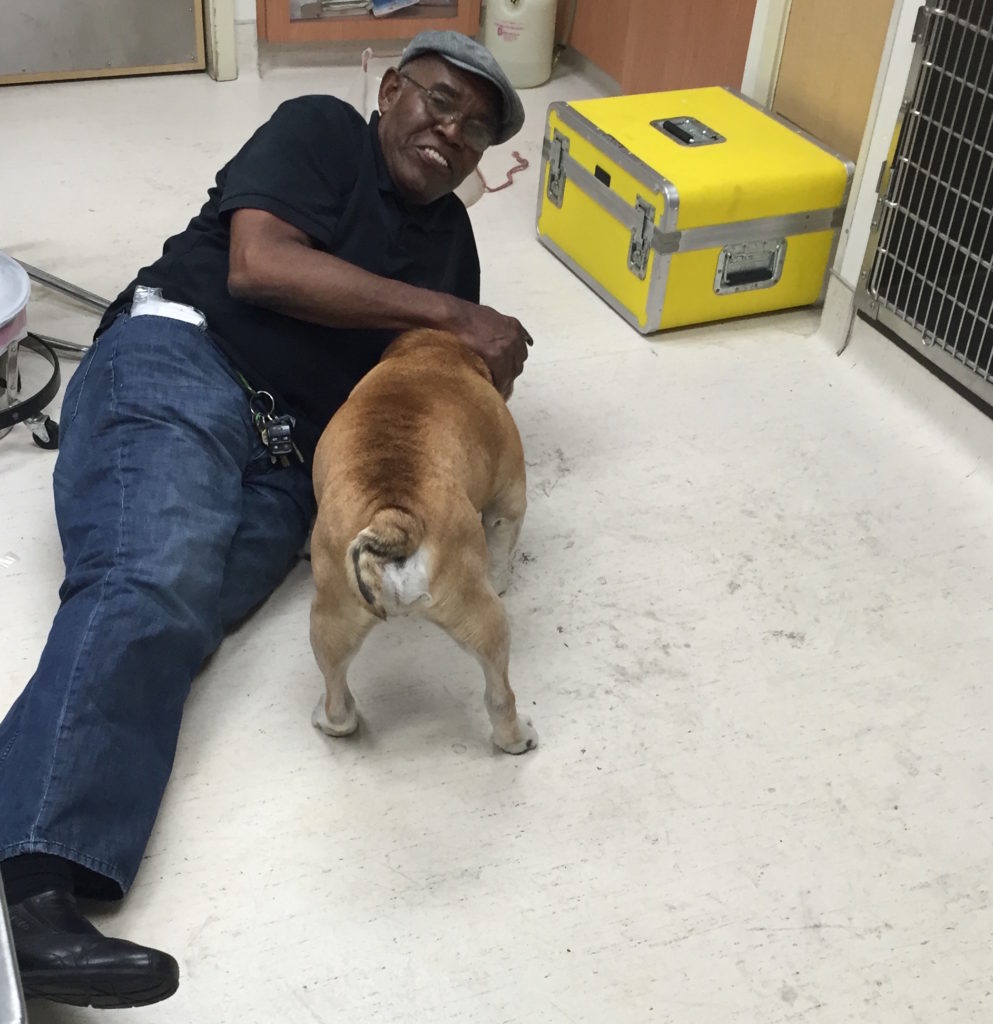 “If you spend time with animals, they get to know your moods. When you feeling sad, they’ll feel sad. They give you that look. Sometime, they’ll try to bring you out of it,†says Mr. Hurskin.
“If you spend time with animals, they get to know your moods. When you feeling sad, they’ll feel sad. They give you that look. Sometime, they’ll try to bring you out of it,†says Mr. Hurskin.
Whenever he had an appointment for chemo, Mr. Hurskin would bring Nigel over to the clinic, walking quietly in the back door and straight to “his” crate on the bottom row in the middle in the treatment room. When it’s too hot, Nigel pushes aside the towel meant to make him comfortable. After touching base with the staff, offering fatherly advice about life and saving your money, Mr. Hurskin would drive off in his red jaguar, returning a few hours later to collect Nigel and head for home.
In late April of 2016 Mr. Hurskin’s health began to decline. Nigel was back at the clinic while Mr. Hurskin was in the hospital fighting his way through pneumonia and still looking forward. “I just don’t feel that I’m strong enough to do the things Nigel needs, like take him walking and stuff right now, stuff he needs to be doing. He needs to be exercised. He likes outside. I can’t do that right now. I don’t know what I’m going to do. First, I know I got to be well. Get that straight.â€
“Nigel can’t be there with him; he wants to be but he can’t,†says Dr. Tyson. “They both can’t continue to thrive together. Having two advanced age candidates together is hard because one feels obligated to make sure that the other is doing okay. And when the other is not doing okay, in this situation, it will make him docile and quiet, like Nigel is now. He’s pensively waiting.â€
It is now October 2016 and, like Nigel, Mr. Hurskin is much on the minds of the staff at the clinic – praying for him to have a peaceful journey when his time comes, and hoping that he truly knows what a tremendous gift he has given to Nigel and to the humans at the Foundation and clinic who love them both dearly.
# # #

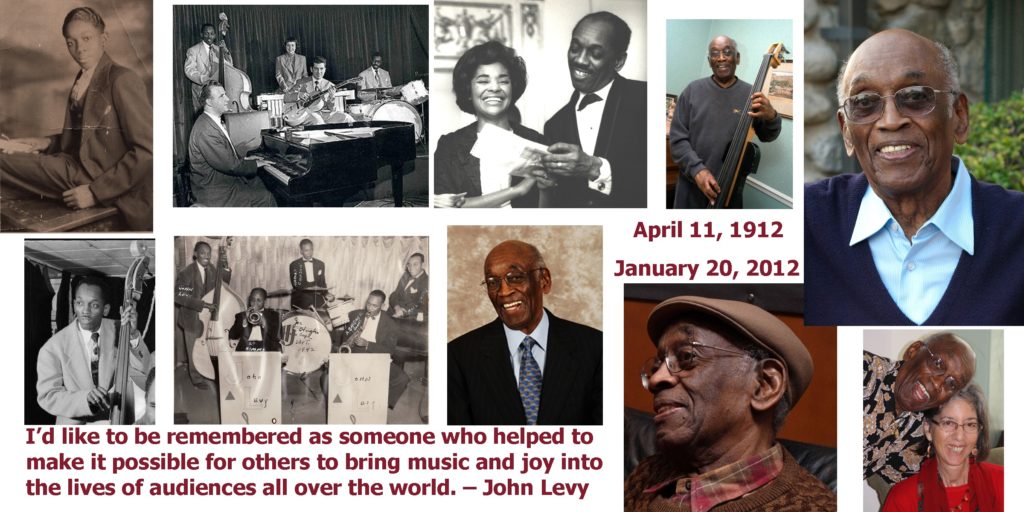
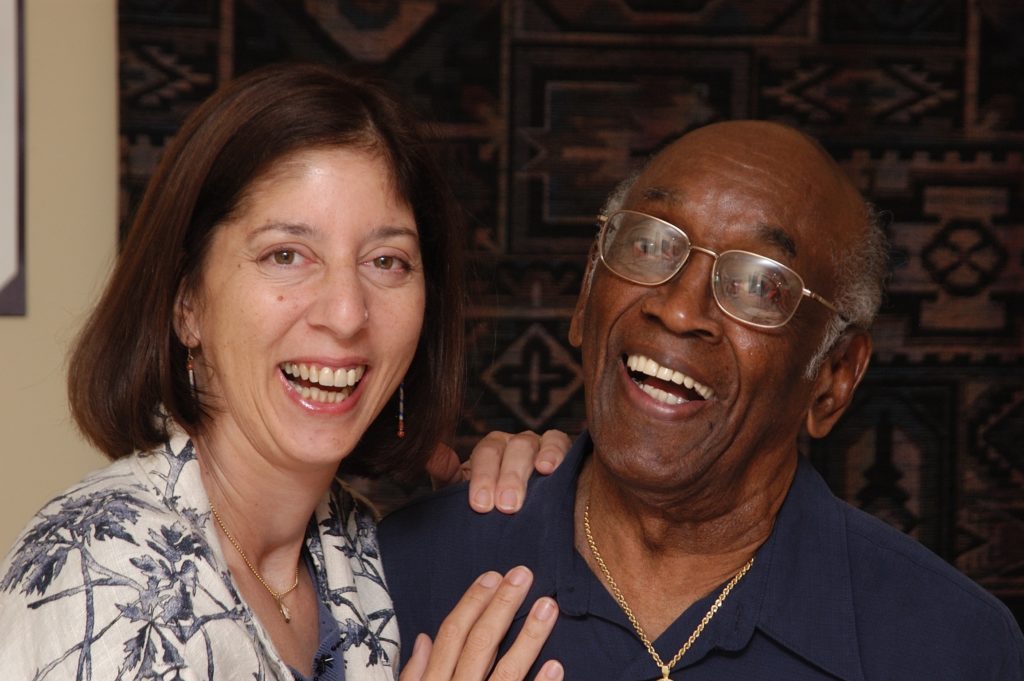
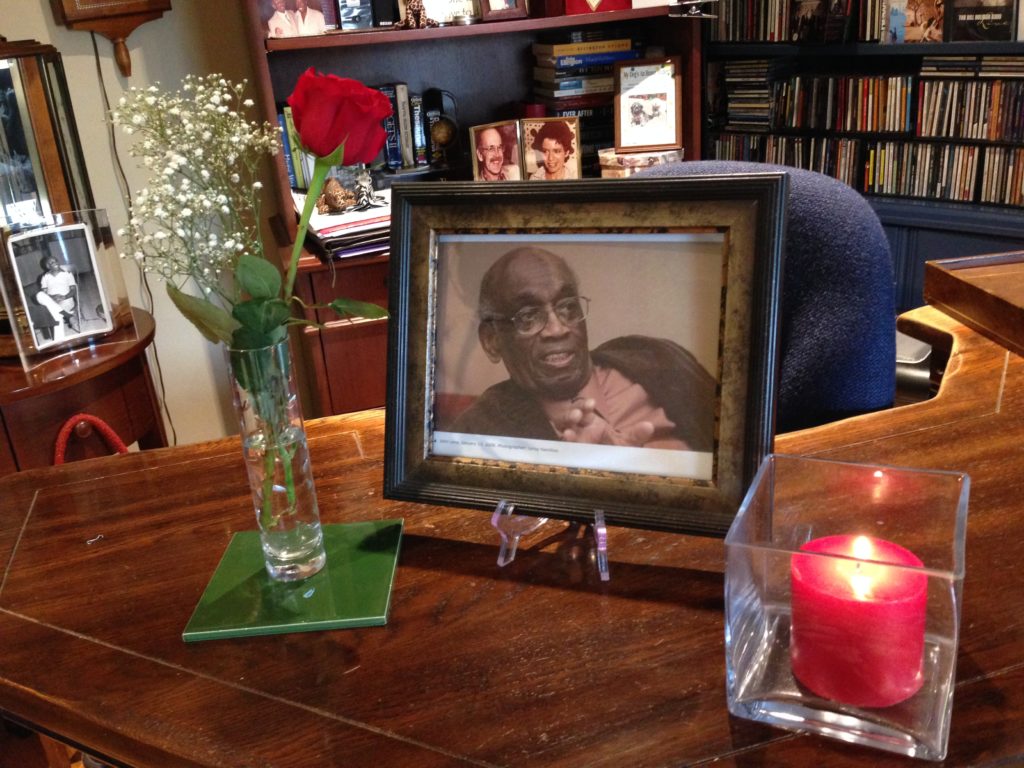
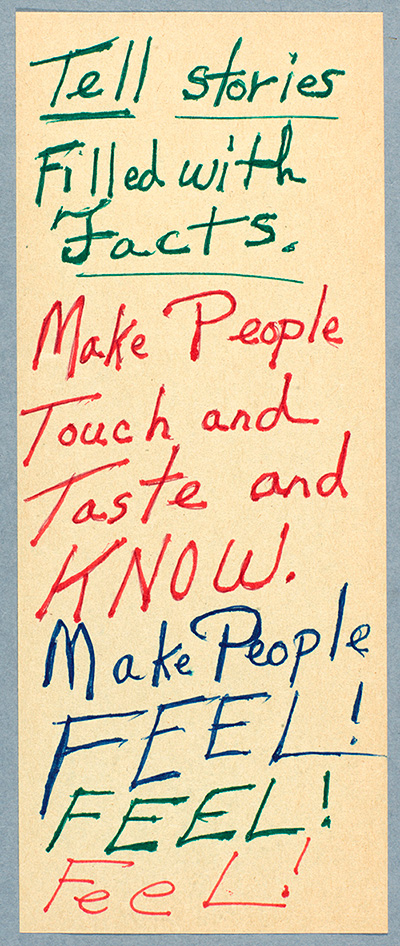
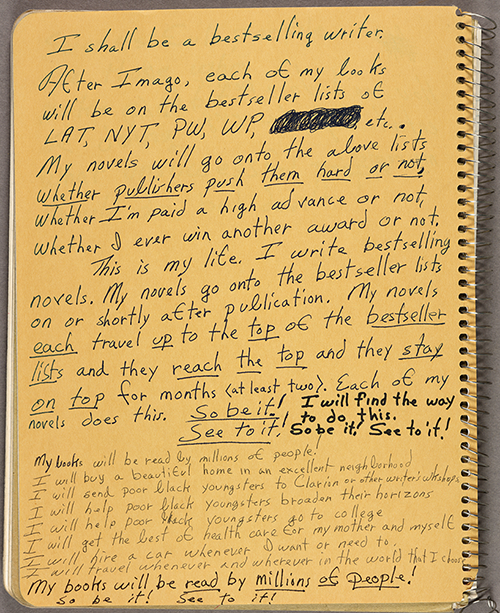
 Nigel, who had come back to the foundation not long before Cleo’s passing, is an interesting case because he wasn’t abandoned or treated badly. He was an adorable puppy bought in a pet store by a lovely couple who loved him.The couple didn’t know that bulldogs are prone to have eye problems, but they took care of him as best they could.
Nigel, who had come back to the foundation not long before Cleo’s passing, is an interesting case because he wasn’t abandoned or treated badly. He was an adorable puppy bought in a pet store by a lovely couple who loved him.The couple didn’t know that bulldogs are prone to have eye problems, but they took care of him as best they could. “If you spend time with animals, they get to know your moods. When you feeling sad, they’ll feel sad. They give you that look. Sometime, they’ll try to bring you out of it,†says Mr. Hurskin.
“If you spend time with animals, they get to know your moods. When you feeling sad, they’ll feel sad. They give you that look. Sometime, they’ll try to bring you out of it,†says Mr. Hurskin.